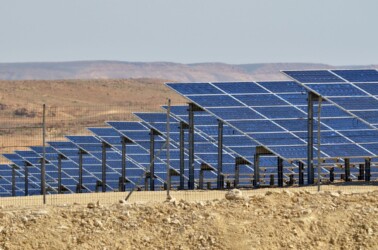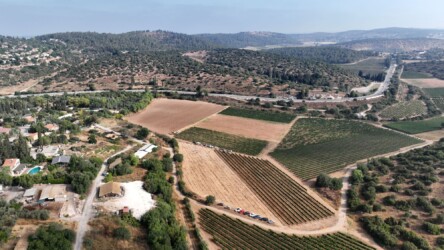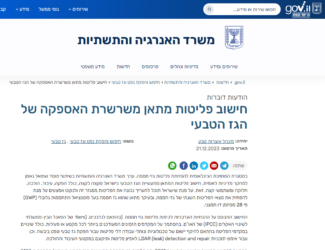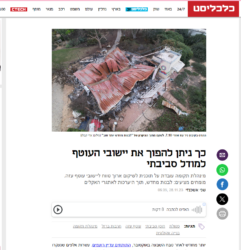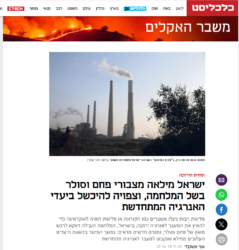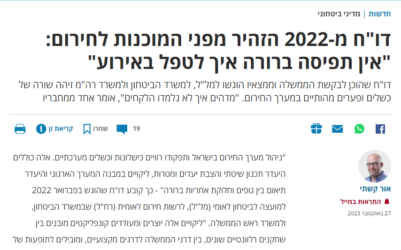Connect to schedule an interview
+972.4.829.2329
Neaman in the media
Prof. Ofira Ayalon discusses a temporary peak of electricity production from renewable energy sources
Prof. Ofira Ayalon on ‘Three Who Knows’: New Israeli record for electricity production from renewable energy
Startup Companies in Times of Crisis – Insights
The latest report from the Samuel Neaman team offers valuable insights gathered from a comprehensive study involving in-depth interviews with Israeli startup company managers across diverse sectors. The aim was to uncover the challenges they faced and
The Gray Area Between Green and Red: Cost-Benefit Considerations of a Polluting Company’s Contribution to Environmental Research or Academic Projects
Prof. Ofira Ayalon and Prof. Adi Wolfson address the benefits and drawbacks as well as possible greenwashing of polluting industries donating money to the academia
The Ministry of Agriculture is one of the few ministries preparing for climate change
Prof. Eyal Shimoni, Head of Food&Water Security research group, welcomes the Ministry of Agriculture’s plan to address climate change, but believes it is not enough
He emphasizes that food security entails protracted processes, necessitating a comprehensive analysis of trends extending to 2050, and urges the government to allocate considerably more resources to the sector and implement further measures to combat this existential threat.
Democracy as a Critical Infrastructure during a State of Emergency
A recent report authored by the Samuel Neaman Institute team addresses the topic of “Democracy as a Critical Infrastructure during a State of Emergency.” This study was carried out in partnership with the Minerva Center at the University of Haifa, and
Prof. Ofira Ayalon in an interview on hydroponic agriculture
Prof. Ofira Ayalon talks about hydroponic agriculture and the benefits of eSoil in the ‘Three Who Know’ program – KAN Tarbut
Assessment of Methane Emissions from Natural Gas Supply Chain in Israel
As part of its international commitment to reducing greenhouse gas emissions, the Ministry of Energy and Infrastructures, in cooperation with the Samuel Neaman Institute for National Policy Research, conducted an end-to-end calculation of methane emissions from Israel’s natural gas industry, including production, processing, transmission, distribution, and end users. This is so that Israel can correctly assess emissions from this sector and take measures to reduce its annual inventory of greenhouse gas emissions, especially methane, which is a greenhouse gas with global warming potential (GWP) 28 times more than carbon dioxide
Link to the full message on GOV.IL
Link to the report: Assessment of Methane Emissions from Natural Gas Supply Chain in Israel
This is how the Western Negev can be turned into an environmental model
The Takuma Administration is working on a plan for long-term rehabilitation of the Western Negev. Experts suggest: Rebuild, while preparing for climate challenges
Prof. Ofira Ayalon, an energy and environmental expert, together with colleagues Prof. Adi Wolfson and Galia Limor Sagiv, outline in their work, submitted to the Takuma Administration, the main areas to which input should be devoted when building sustainable resilience: sustainable agriculture and food security, green building, energy, sustainable transportation, adaptation to climate change, urban renewal and waste management.
link to the full article on Calcalist
Link to an interview on the subject, on ‘CAN Tarbut’ (Strats at 1:37:00)
With the ongoing war, Israel has increased its coal and diesel reserves, and is expected to fail in its renewable energy targets
In many countries worldwide, periods of crisis have presented opportunities to enhance resilience and expedite the development of advanced infrastructures.
According to Professor Ofira Ayalon, addressing aspirations, dismantling regulatory barriers, and expanding the scope of renewables are crucial components, each requiring distinct attention. The United States has embraced the Green Deal initiative as a post-COVID-19 recovery strategy, emphasizing investments prioritizing the shift to zero-emission industries. Similarly, the EU is committed to substantial funds to such initiatives. In Israel, this matter must be ranked among the top ten urgent issues, necessitating investments alongside the swift removal of technical and regulatory obstacles. These infrastructural developments not only generate new employment opportunities but also yield long-term economic savings.
A 2022 report warned of emergency preparedness
“It is sad to learn that the NSC has now asked for advice on strengthening national resilience. This is not something that is built in a day, it requires long-term planning,” says Col. (res.) Dr. Reuven Gal, who served as deputy head of the National Security Council during the second intifada and is currently a senior research fellow at the Samuel Neaman Institute for National Policy Research at the Technion.
“History teaches us that in moments of crisis you need a leader who is highly trusted and knows how to provide a sense of security. This is not the situation now in Israel, and the NSC cannot solve it.”

